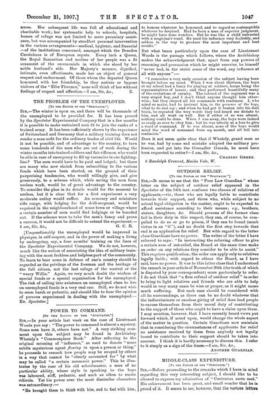POWER TO COMMAND.
[To THE Roma or THE "SPECTATOR.'] Sus,—In your article last week on the case of Lieutenant Woods you say : " The power to command is almost a mystery. Some men have it, others have not." A very striking com- ment upon this subject may be found in Archbishop Wbately's Comnionphipe Book." After referring to the original meaning of "influence," as used to denote " some subtle mysterious agent flowing in upon a person or thing," he proceeds to remark bow people may be swayed by others in a way that cannot be "clearly accounted for" by what may be called "a certain mesmeric power." This he illus- trated by the case of his old schoolmaster; a man of no particular ability, whose style in speaking to the boys was laboured, stiff, pedantic, and such as often to excite ridicule. Yet his power over the most dissimilar characters was extraordinary :-
"He brought them to think with him, and to feel with him ;
to honour whatever he honoured, and to regard as contemptible whatever he despised. Had he been a man of superior judgment, he might have done wonders. Bid he was like a child entrusted with a magician's wand. He used his influence very foolishly, and seldom in the way to produce the most important and beet results."
But what bears particularly upon the case of Lieutenant Woods is the passage which follows, where the Archbishop makes the acknowledgment that, apart from any powers of reasoning and persuasion which he might exercise, he himself " never had, in the strict sense of the word, any influence at
all with anyone" :-
"I remember a very early occasion of the subject having been brought before my mind. When I was about thirteen, the boys at my school had a fancy for playing at soldiers, hoops being the representatives of horses ; and they performed beautifully many of the evolutions of cavalry. The colonel of the regiment was a very stupid boy, and I don't think anyone thought him other- wise ; but they obeyed all his commands with readiness. I, who acted as major, had to instruct him, in the presence of the boys, what to do and say ; and when he had got it beaten into his dull brain, he repeated the very words they had heard me dictate to him, and all went on well. But if either of us was absent, nothing could be done. When I was away, the boys were indeed as ready as ever to obey him ; but he was utterly at a loss to give a word of command. If he was absent, none of the boys would mind the word of command from my mouth, and all fell into confusion."
Does it not seem quite clear that if Whately, grand man as he was, had by some sad mistake adopted the military pro- fession, and got into the Grenadier Guards, he must have
been requested to retire P—I am, Sir, &c.,
CHARLES GREEN.
8 Randolph Crescent, Maida Vale, W.














































 Previous page
Previous page